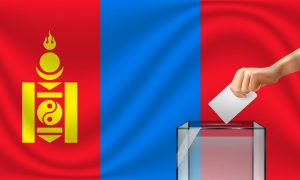Khurelsukh Ukhnaa of the Mongolian People’s Party (MPP) looks to have scored the biggest victory in a presidential election in the 30 years since Mongolia’s democratic revolution. With 99.7 percent of the vote reported, Khurelsukh had notched 68 percent of votes, making him the first candidate ever to receive more than two-thirds of the votes. Previously, the highest victory had been recorded in 1997 in Natsagiin Bagabandi’s first election, where he received just over 60 percent of the votes. Khurelsukh’s overwhelming victory has come in the context of a long-term decline in voter turnout, holding roughly steady in this election at 59.2 percent.
Meanwhile, the Democratic Party (DP) candidate, Erdene Sodnomzundui, had a dismal showing, notching just 6 percent of the vote. Shockingly, his 72,569 votes barely beat out the number of blank ballots at 71,738. It was a hard fall for the party of incumbent President Battulga Khaltmaa.
During its campaign, the MPP publicly touted its government’s COVID response. Mongolia had vaccinated over 97 percent of its adult population (half with two doses) by the end of May. However, cases have been rising again sharply, with Mongolia’s daily case rate reaching levels that peaked in April, when a strict lockdown was in place. To the extreme ire of many Mongolians, the presidential election debate event by the national broadcaster scheduled for the eve of the election was cancelled at the last minute, after one of the three candidates, Enkhbat, tested positive for COVID-19 and was hospitalized. Last minute attempts to organize an event on Clubhouse moderated by journalist Jargalsaikhan resulted in Enkhbat and Erdene speaking in separate online Clubhouse/Zoom/Facebook streams, and no word from Khurelsukh.
The election capped a tumultuous six month in Mongolian politics. In January, protests against Mongolia’s handling of the COVID-19 pandemic gained steam – and led to abrupt resignation of then-Prime Minister Khurelsukh Ukhnaa. Even at the time, there was speculation that Khurelsukh was less interested in taking responsibility amid public criticism than in maneuvering himself into position to be the MPP candidate in the presidential election. Sure enough, that’s exactly where he wound up.
Meanwhile, the MPP took advantage of its supermajority in the Mongolian parliament to pass constitutional amendments limiting presidents to a single term – which effectively eliminated incumbent President Battulga from running. Battulga did not take the change sitting down; he even attempted to outlaw the MPP, charging it with abuses of power, with the complicity of the military.
The DP’s course has been tortured and uncertain for months; it is still dealing with the aftermath of contested party elections for chairman held in March. In the end, Mongolia’s election commission accepted Erdene as the DP’s presidential candidate (former DP MP Altankhuyag Norov was submitted as candidate by a wing of the party, including all of the DP’s MPs). While DP stalwarts such as former President Elbegdorj Tsakhia and long-time MP and mayor of Ulaanbaatar Bat-Uul publicly supported Erdene, Battulga did not come around to lend his support to the decision. It was clear from Wednesday’s results that the DP could not overcome internal schisms. Erdene not only finished a distant third, but barely beat out blank ballots – likely, at least in part, attributable to disenchanted DP voters leaving their ballots blank. Ultimately, it seems even DP supporters found Erdene an unattractive candidate.
Instead, the second-place finish went to Enkhbat Dangaasuren of the relatively recently founded National Labor Party (KhUN), who garnered 20 percent of the vote. “There has been significant social media support for Enkhbat, especially among Mongolians abroad and Mongolian youths in Mongolia,” analyst Bolor Lkhaajav noted in a pre-election interview with The Diplomat. “… Enkhbat is favored mainly because the people do not want cronies from the MPP and DP.”
As expected, Enkhbat received the lion’s share of his support from urban voters. In some of the most populous Ulaanbaatar districts, he received more than a third of the ballots cast. But this support has apparently come largely at the expense of the DP’s Erdene, who performed even more dismally in the capital city than across the country.
The solid performance by Enkhbat raises the possibility that KhUN could replace the DP as a viable opposition party. For now, though, neither seems positioned to seriously challenge the MPP. The lopsided results will only bolster concerns that Mongolia is moving toward one-party rule, with the MPP now solidly in control of both the legislature and the presidency. The party has previously faced accusations of corruption, with little accountability thus far.
Khurelsukh’s election puts the MPP firmly in charge of Mongolia’s political agenda until the next parliamentary election in 2024. Khurelsukh’s six-year term will not be marred by ambitions for re-election, as recent constitutional changes limit him to a single term. His nomination as a presidential candidate required him to resign from the MPP and a new party leader will have to be chosen who will share in setting the strategic direction for Mongolia in the coming years.
One of the main questions that Khurelsukh will face is whether he follows his predecessor Battulga in focusing almost exclusively on Russia in foreign relations, with a grudging acknowledgment of China’s looming presence to the south, or whether he re-embraces the internationalism that has characterized Mongolia’s foreign policy for most of the past 30 years. Leading up to the election, the MPP doubled-down on plans to develop “mega-projects” refining natural resources for export. The other urgent policy in need of a president’s attention will be the independence of Mongolia’s judiciary, which will be crucial to any kind of credible initiatives to counter corruption.
































